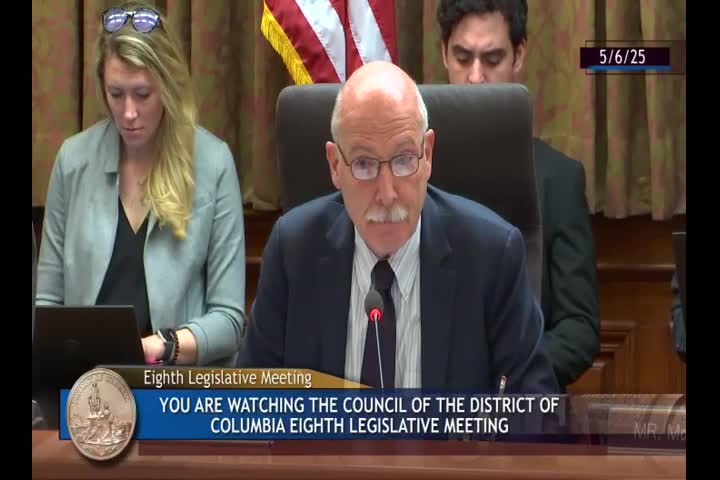D.C. Council advances ERAP reform to tighten documentation, limit eviction delays to approved applications
Get AI-powered insights, summaries, and transcripts
Subscribe
Summary
The Council passed an amendment-in-the-nature-of-a-substitute to the Emergency Rental Assistance Program Reform Amendment Act of 2025 that narrows eviction rescheduling to cases with approved ERAP applications, clarifies required payment documentation, and allows judges discretion on rent-waiver defenses at motions as well as trial.
The Council of the District of Columbia on May 6 advanced legislation to revise the city’s Emergency Rental Assistance Program (ERAP), approving an amendment in the nature of a substitute that changes how courts and landlords handle ERAP-related eviction delays.
The amendment, moved by Councilmember Fruman, narrows the circumstances in which evictions may be rescheduled: only tenants with approved ERAP applications — not pending ones — can obtain stays tied to ERAP. The substitute also clarifies what payment documentation housing providers must give, limits how judges may apply the rent-waiver defense tied to ERAP compliance, and allows the defense to be raised on decisive motions that dispose of an entire eviction case as well as at trials.
Why it matters: Councilmember Fruman said the changes are meant to return ERAP to a narrowly targeted emergency program, make district dollars go farther, and reduce court and landlord costs while protecting tenants who qualify. “With this ANS, the bill before us today would return ERAP to its original limited purposes, make our district dollars go farther, and make our district courts fairer,” Fruman said. He described the ANS as the product of months of negotiation with housing providers, tenant advocates and court practitioners.
What the amendment does: According to Fruman’s explanation on the floor, the ANS: - Narrows required payment information to a few specified categories while listing examples for clarity. - Limits eviction rescheduling to tenants whose ERAP applications have been approved, rather than those with pending applications. - Clarifies the scope of judges’ discretion in applying a rent-waiver defense when landlords have not complied with ERAP procedures. - Permits the rent-waiver defense to be resolved on motions that dispose of all claims and defenses in a case, not only at trial.
Support and concern: Councilmember Parker praised the months of negotiation that produced the ANS and said it “strikes a better balance between tenants and property owners.” Councilmember Robert White and others thanked Fruman and his staff for the work; White described the measure as “well balanced.”
Opposition and equity concerns: Councilmember Lewis George said he remained unconvinced the changes would protect low-income residents, citing a Racial Equity Impact Analysis (RIA) that, he said, “found this bill was written [and] stated that this will likely harm housing for residents of colors who need to utilize ERAP.” Lewis George said the RIA suggested the bill was unlikely to prevent fraud and might reduce housing protections for residents of color; he recorded a “no” vote on the amendment and on the bill as amended.
Vote and next steps: The amendment in the nature of a substitute was approved on the floor and the bill as amended was approved at this legislative meeting. Councilmember Lewis George was recorded as voting no on the final action; other individual vote records were not individually read into the public record during the broadcast of the vote. The bill as amended will continue through the Council’s legislative process.
Context: Councilmember Fruman said the ANS is the culmination of three months of meetings and dozens of drafts designed to reconcile tenant protections with operational clarity for housing providers and the courts. He acknowledged the stakes for landlords who fear delayed or denied applications could impose costs, and for tenants who need timely relief.
Looking ahead: Fruman said he looks forward to passing the legislation and thanked his committee director, Dan Pissant, and stakeholders who participated in drafting the ANS.
